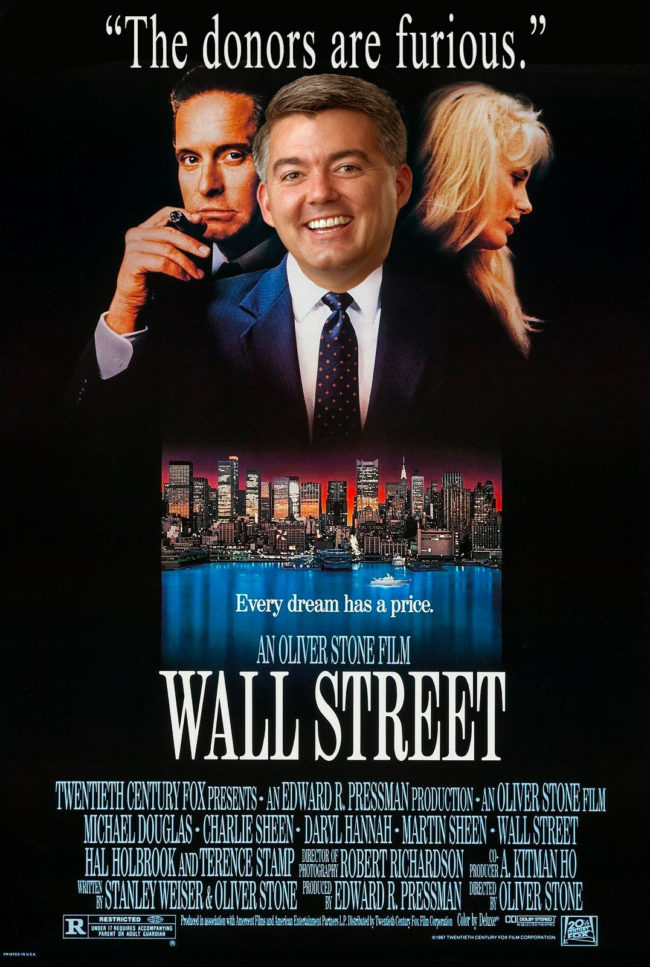
U.S. Senate
See Full Big Line
(D) J. Hickenlooper*
(R) Somebody
80%
20%

Governor
See Full Big Line
(D) Phil Weiser
(D) Joe Neguse
(D) Jena Griswold
60%
60%
40%↓

Att. General
See Full Big Line
(D) M. Dougherty
(D) Alexis King
(D) Brian Mason
40%
40%
30%

Sec. of State
See Full Big Line
(D) A. Gonzalez
(D) George Stern
(R) Sheri Davis
50%↑
40%
30%

State Treasurer
See Full Big Line
(D) Brianna Titone
(R) Kevin Grantham
(D) Jerry DiTullio
60%
30%
20%

CO-01 (Denver)
See Full Big Line
(D) Diana DeGette*
(R) Somebody
90%
2%

CO-02 (Boulder-ish)
See Full Big Line
(D) Joe Neguse*
(R) Somebody
90%
2%

CO-03 (West & Southern CO)
See Full Big Line
(R) Jeff Hurd*
(D) Somebody
80%
40%

CO-04 (Northeast-ish Colorado)
See Full Big Line
(R) Lauren Boebert*
(D) Somebody
90%
10%

CO-05 (Colorado Springs)
See Full Big Line
(R) Jeff Crank*
(D) Somebody
80%
20%

CO-06 (Aurora)
See Full Big Line
(D) Jason Crow*
(R) Somebody
90%
10%

CO-07 (Jefferson County)
See Full Big Line
(D) B. Pettersen*
(R) Somebody
90%
10%

CO-08 (Northern Colo.)
See Full Big Line
(R) Gabe Evans*
(D) Yadira Caraveo
(D) Joe Salazar
50%
40%
40%

State Senate Majority
See Full Big Line
DEMOCRATS
REPUBLICANS
80%
20%

State House Majority
See Full Big Line
DEMOCRATS
REPUBLICANS
95%
5%
 May 30, 2019 10:51 AM UTC
May 30, 2019 10:51 AM UTC 8 Comments
8 Comments If Senator Cory Gardner wants to win his tough re-election fight next year, there’s really no constituency he can ignore–which helps explain why he’s all over the map on so many issues. But over a decade in Congress, and especially since entering the Senate, Gardner has allied himself closely with the one sector of society that
If Senator Cory Gardner wants to win his tough re-election fight next year, there’s really no constituency he can ignore–which helps explain why he’s all over the map on so many issues. But over a decade in Congress, and especially since entering the Senate, Gardner has allied himself closely with the one sector of society that
Greed is good, says Cory Gardner.
Take the above article, replace “Cory Gardner” with “Michael Bennet” and it’s likely to be equally accurate.
I’d like to see Gardner replaced, but it grinds me that he is pilloried for actions equivalent to Bennet that Dems give Bennet a pass on.
Except that's bullshit, Dave, because I clicked through and looked at the votes. Of the 15 votes AFR flagged, Gardner voted yes on 14. Bennet voted yes on FOUR.
I know it's fashionable around here to beat up our own, but your contention that replacing Gardner's name with Bennet's is a bunch of fucking bullshit. All you're doing is making people cynical for no reason. There is a difference between the parties, and just because you get your rocks off by pretending to be better than everybody doesn't make you right.
I'm sorry but fuck this. Be accurate or shut the fuck up with your inane bothsider blathering.
Fuck you too Zappy. 🙂
Where has Zappy been lately? Did the idea – as far fetched as it may be – of a President Michael Bennet finally take its toll on him? Or is he trying to get a good seat at tonight's Bennet Town Hall on CNN?
Do you think Garder is more in the tank for Wall St than Bennet? On a lot of other subjects Bennet is world's better than Gardner – but do you truly see a lot of difference on this?
As to these specific votes, sorry I did assume, and I was wrong, that Bennet would have been the same on all the votes. But I do think, if his vote was critical to pass (or fail) what Wall St wanted – Bennet is there for them.
From the day Michael Bennet was named as Obamas' choice for his senate seat, he has done little to nothing to dispel the notion that he is in the tank for the bank. Will he disavow PAC money, f'rinstance? Run a grass roots campaign, maybe? Change the way you vote? Show us you mean it, senator.
It isn't likely Senator Bennet could approach his junior colleague in fealty to the Titans of Wall Street, but there is a reason he has never shaken the nickname "Thurston".
All those insipid Eurovision videos have rotted your brain, Dave.